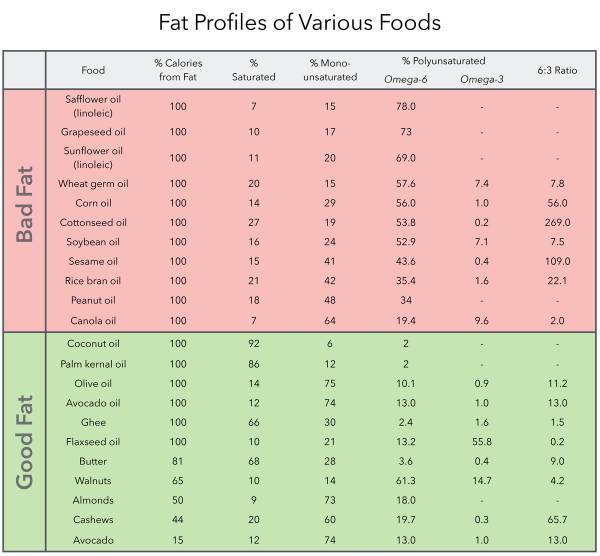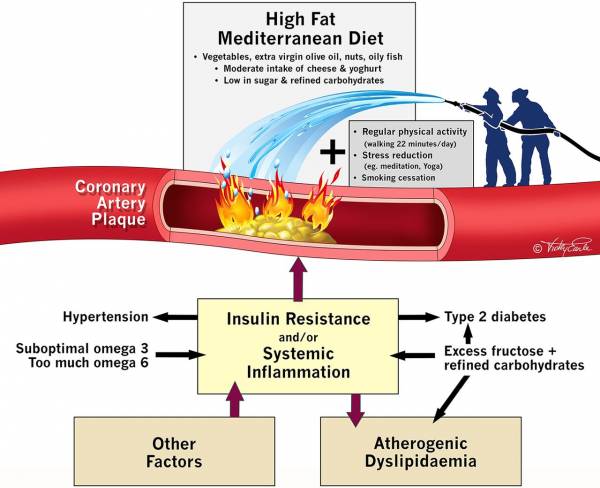Digest this message for a minute: “Saturated fat does not clog the arteries: coronary heart disease is a chronic inflammatory condition, the risk of which can be effectively reduced from healthy lifestyle interventions.”
That’s the headline of an article in the British Journal of Sports Medicine. In a comprehensive study of a wealth of research, the article says, “Decades of emphasis on the primacy of lowering plasma cholesterol, as if this was an end in itself, and driving a market of ‘proven to lower cholesterol’ and ‘low-fat’ foods and medications, has been misguided.”
Eating was designed to be a pretty simple thing to do. It’s almost instinctual. You need food to fuel your body, and animals never seem to have much of a problem figuring out how to diet. Granted, animals live in a Darwinian ecosystem, where it really is survival of the fittest. Man lives in a world that has In-N-Out burger drive-thrus. It’s pretty obvious that humankind has evolved to the point of not knowing anything about anything.
For a number of years, we have been told there are good fats—usually the kind that stay liquid at room temperature, like olive oil—and allegedly bad fats that are solid at room temperature, like the fatty trim on a decent T-bone.

We have also been told that cholesterol is not a good thing. There’s bad cholesterol, LDL (low-density lipoprotein), and good cholesterol, HDL (high-density lipoprotein). Your insurance premiums go through the roof if you have bad cholesterol. Bad cholesterol is supposed to lead to coronary disease and untimely death (not that there is any timely death from the dying person’s perspective).
However, the researchers in this overview study of saturated fats found that coronary disease is, well, a disease. While it may be popular to think of fat as clogging arteries, that’s not what is happening in reality. In one study, it was shown that postmenopausal women with coronary heart disease did, in fact, benefit from greater intake of saturated fat, it being associated with less progression of atherosclerosis, the formation of plaque along the walls of the artery.

The researchers, not afraid to gross out anyone reading, compared the actual process of inflammation that leads to plaque build-up in the arteries to a pimple forming. In short, the LDL cholesterol risk has been overblown all this time.
So, what’s the good news? The Mediterranean Diet. It’s high in fat, it’s delicious, and compared to the typical western diet, efficient in reducing the instance of heart disease, according to various studies.
Exercise—you can never escape it—is good for you. Even better news is that a little goes a long way. Compared to doing nothing, a brisk walk at or above 150 min/week can increase life expectancy by 3.4–4.5 years, independent of body weight.
When it comes to coronary disease, brisk walking is going to be better than running. And just 30 min of moderate activity a day more than three times per week significantly improves insulin resistance, which is associated with obesity for certain segments of the population, particularly those with a sedentary lifestyle.
We will grant that fat has a calorific value. It’s a real thing to say that you will put on weight if you eat more than you can burn. However, from what we can tell, common sense seems to be the real winner here. Eat good stuff in moderation, work out in moderation, and you’ll keep your body ticking along nicely. Sit around and do nothing, and chow down on foods of dubious origin, and the odds will turn against you at some point.

The proviso for these types of findings should always be that you keep it simple. For the vast majority of people, their health can benefit from totally unobtrusive activities, and eating isn’t about deprivation, but good choices. Making wise decisions is about the most scientific thing you can do for a healthier life and longevity.






